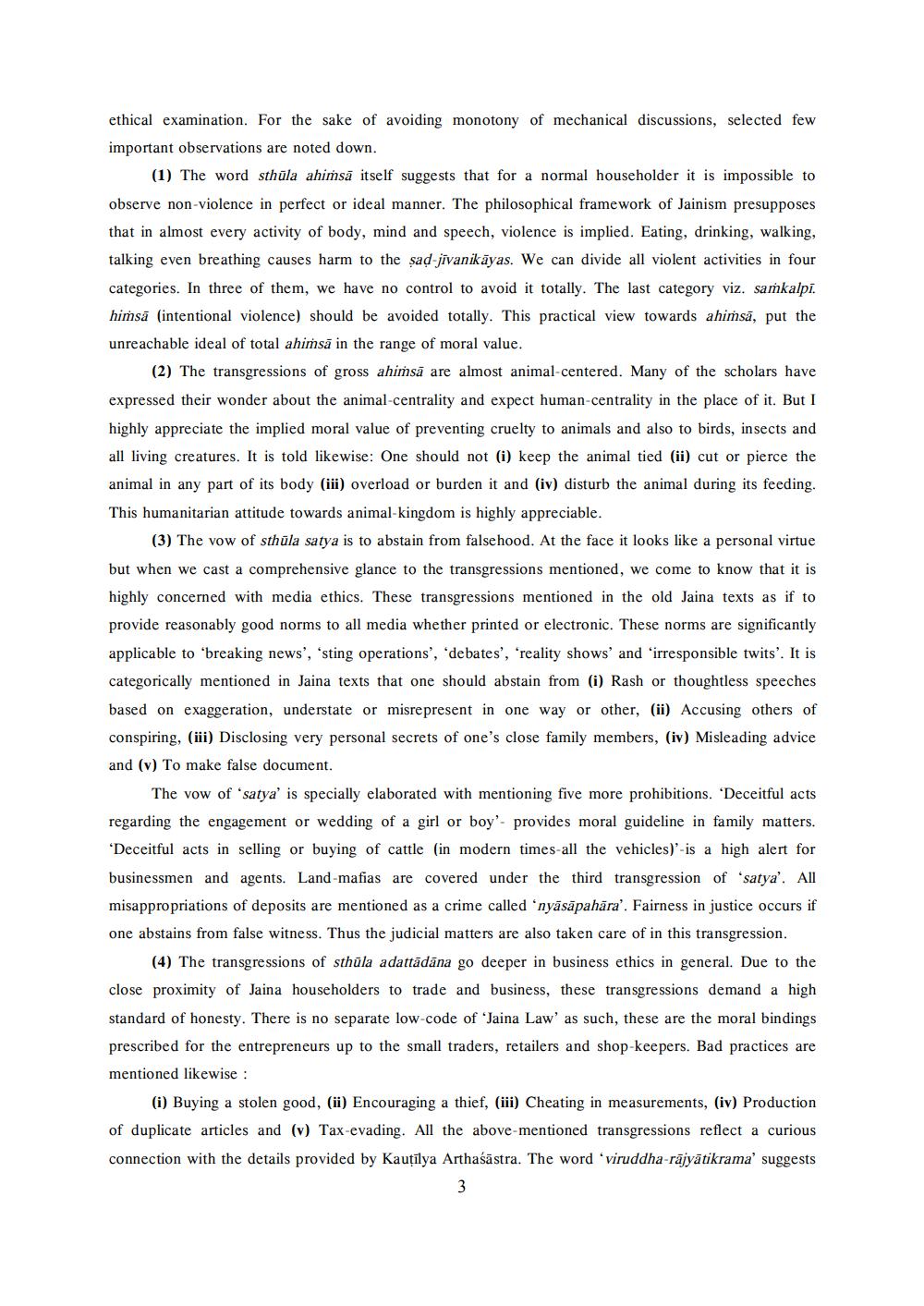Book Title: Etical Values Reflected in Jain Philosophy Author(s): Nalini Joshi Publisher: Nalini Joshi View full book textPage 3
________________ ethical examination. For the sake of avoiding monotony of mechanical discussions, selected few important observations are noted down. (1) The word sthūla ahimsā itself suggests that for a normal householder it is impossible to observe non-violence in perfect or ideal manner. The philosophical framework of Jainism presupposes that in almost every activity of body, mind and speech, violence is implied. Eating, drinking, walking, talking even breathing causes harm to the sad jivan ikāyas. We can divide all violent activities in four categories. In three of them, we have no control to avoid it totally. The last category viz. saņkalpi. himsā (intentional violence) should be avoided totally. This practical view towards ahiṁsā, put the unreachable ideal of total ahimsă in the range of moral value. (2) The transgressions of gross ahimsā are almost animal-centered. Many of the scholars have expressed their wonder about the animal-centrality and expect human-centrality in the place of it. But I highly appreciate the implied moral value of preventing cruelty to animals and also to birds, insects and all living creatures. It is told likewise: One should not (i) keep the animal tied (ii) cut or pierce the animal in any part of its body (iii) overload or burden it and (iv) disturb the animal during its feeding. This humanitarian attitude towards animal-kingdom is highly appreciable. (3) The vow of sthūla satya is to abstain from falsehood. At the face it looks like a personal virtue but when we cast a comprehensive glance to the transgressions mentioned, we come to know that it is highly concerned with media ethics. These transgressions mentioned in the old Jaina texts as if to provide reasonably good norms to all media whether printed or electronic. These norms are significantly applicable to 'breaking news', 'sting operations', 'debates', 'reality shows' and 'irresponsible twits'. It is categorically mentioned in Jaina texts that one should abstain from (i) Rash or thoughtless speeches based on exaggeration, understate or misrepresent in one way or other, (ii) Accusing others of conspiring, (iii) Disclosing very personal secrets of one's close family members, (iv) Misleading advice and (v) To make false document. The vow of 'satya' is specially elaborated with mentioning five more prohibitions. 'Deceitful acts regarding the engagement or wedding of a girl or boy' provides moral guideline in family matters. 'Deceitful acts in selling or buying of cattle (in modern times all the vehicles)-is a high alert for businessmen and agents. Land-mafias are covered under the third transgression of 'satya'. All misappropriations of deposits are mentioned as a crime called 'nyāsāpahāra'. Fairness in justice occurs if one abstains from false witness. Thus the judicial matters are also taken care of in this transgression. (4) The transgressions of sthūla adattādāna go deeper in business ethics in general. Due to the close proximity of Jaina householders to trade and business, these transgressions demand a high standard of honesty. There is no separate low-code of 'Jaina Law' as such, these are the moral bindings prescribed for the entrepreneurs up to the small traders, retailers and shop-keepers. Bad practices are mentioned likewise : (i) Buying a stolen good, (ii) Encouraging a thief, (iii) Cheating in measurements, (iv) Production of duplicate articles and (v) Tax-evading. All the above-mentioned transgressions reflect a curious connection with the details provided by Kauțīlya Arthaśāstra. The word 'viruddha-rājyātikrama' suggestsPage Navigation
1 2 3 4 5 6
